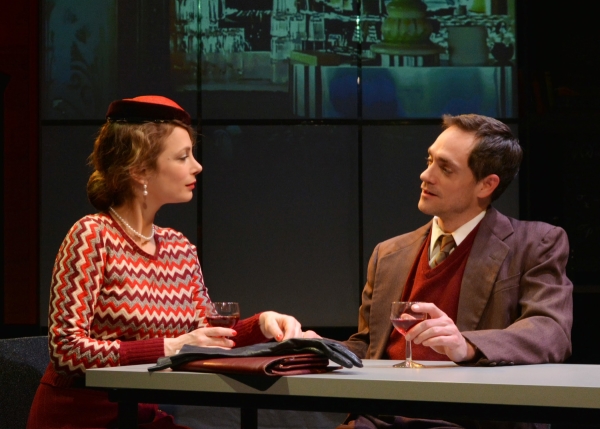A Happy End

(© Kim T. Sharp)
The title's irony is apparent from the start. Very little — particularly in Berlin where Iddo Netanyahu's World War II-era drama A Happy End is set — came to a happy end during that period of time. As in any history play, the audience has one up on the characters, watching as the decisions they make seal an absolute and irreversible fate. What the stories lack in mystery, they make up for in empathy as we watch the individuals we come to care for fall into circumstances now clarified by 20/20 hindsight. On this necessary front, however, Natanyahu's play falls short, leaving us disappointingly numb to the tragic scenario his story presents.
Will they or won't they is the basic dramatic premise of A Happy End. The Erdmanns — a Jewish family living in the heart of Berlin in the 1930s — must decide whether to allow the Nazi Party to chase them from their home or to weather the storm, which, in fact, seems to be blowing by rather quickly. The play opens in November 1932 — a time when the Nazis were licking their wounds over the loss of 2 million votes and 34 seats in the Reichstag. At this point there are far more pressing issues for the Erdmanns to attend to than this dwindling group of political extremists.
Celebrated physicist Mark Erdmann (a stately Curzon Dobell), for example, is awaiting a response to his recent scientific findings, which his charming assistant Dieter Kraft (Joel Ripka) is expected to be presenting at a conference. Mark's elegant wife, Leah, played by the striking Carmit Levité, spends her days at the theater, hobnobbing with intellectuals, while unapologetically orchestrating an illicit affair with her husband's young associate Dieter. Their teenage son, Hans (Phil Gillen), meanwhile, has a bright future ahead of him in German society as an up-and-coming poet.
Domestic events are of much greater concern than any political upheaval overdramatized by the media. Dieter, however, as if privy to images from the future, warns both his boss and his mistress to get out while they can — though neither care to listen. This secret romantic entanglement adds an interesting element to a story we've sadly all heard before.
Yet Netanyahu and director Alex Dmitriev have failed to capitalize on the robust emotions this dynamic adds to the mix. Though Dieter's fervent words occasionally suggest otherwise, Ripka portrays a nonchalant lover whose urgings for the Erdmann family to flee are tinged with neither regret nor self-interest. They are simply words of unbiased reason, spoken with an objectivity someone in his position could not possibly possess. Levité, dressed in dazzling gowns and furs (designed by Laura Crow), performs with enough melodramatic passion for the both of them — perhaps fitting for a character so enthralled with all of the artistic escapes Berlin has to offer. But more often than not, the relationship feels one-sided, lacking the charge that would compel Leah to remain in Germany as the Nazis gain momentum.
Dobell offers a solid performance as a stalwart scientist, pragmatically debating whether to move his work to the United States. Still, as yet another male foil for Leah and her emotional whims, we barely graze the surface of their marital relationship, which should hold the key to all of the choices they eventually do or do not make. Gillen is sympathetic as Hans, but his storyline becomes an afterthought amid his parents' dilemmas (as is Mark's secretary, Anna, played with humor by Lori Gardner in her few moments onstage). Nevertheless, Hans' experiences aptly portray the insidious growth of anti-Semitism throughout the early 1930s. It even comes to infect his relationship with high school sweetheart Martha (a sweet Allison Siko, whose character unfortunately is as generic as her Aryan costuming).
Netanyahu often sacrifices specificity for the sake of this larger cultural picture, undoubtedly with an eye toward the present political climate of anti-Semitism — a topic his brother, Israeli Prime Minister Benjamin Netanyahu, just days ago brought to Congress with an alarm bell. Innocuous images of pre-World War II Germany (curated by Dennis Corsi) are projected on the back wall of designer Blair Mielnik's period-nonspecific environment. Like a window overlooking the street below, we can see the wolf in sheep's clothing ready to devour everything around it. And as both Netanyahus passionately suggest in their respective forums, there is another wolf outside our window at this very moment. While it may be prudent for politicians to tread lightly on such sensitive ground, the theater is a place to shout ideas into the ether as loudly as possible. The Netanyahu afforded with this luxury should take advantage of it.











